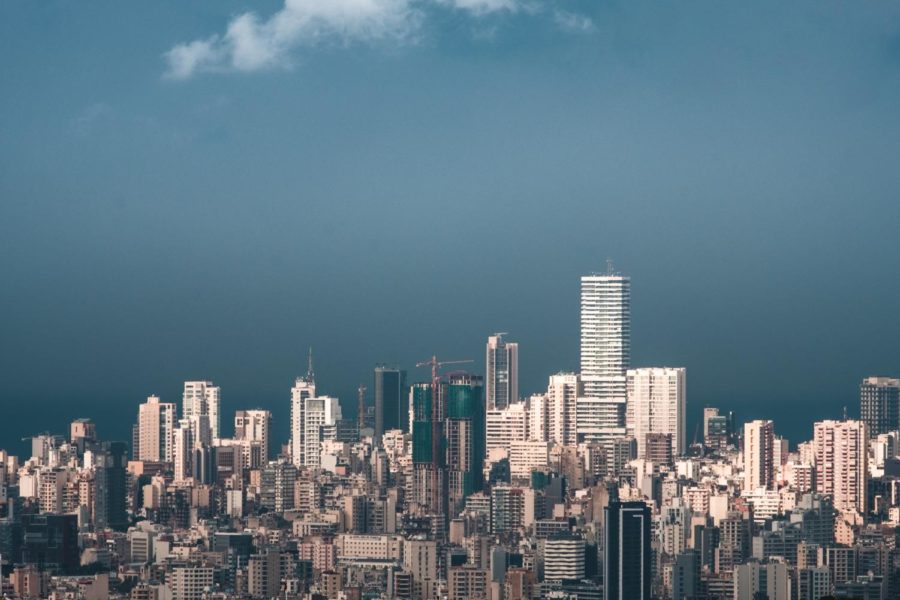Jo Kassis / Pexels
‘This cannot be real’: Lebanese students, locals reflect on resilience and hardship following Beirut explosion
The “Beirut Blast,” one of the largest non-nuclear explosions in human history, impacted people around the world
October 14, 2020
In early August, people around the world with ties to Lebanon found themselves glued to their phones, watching videos of a devastating explosion shake Beirut. Many videos were taken by unsuspecting witnesses, showing different angles of the unfolding tragedy. Despite the variety in the images that emerged as people attempted to understand what happened, nearly all photos managed to capture the tower of pink smoke rising above the port.
The explosion on Aug. 4, often referred to as the “Beirut Blast,” would soon be recognized as one of the largest non-nuclear explosions in history. It occurred in a succession of two explosions, the second of which was the more powerful of the two by far, and was heard nearly 100 miles away in Cyprus. The origin was soon discovered to be accidental detonation of 2,750 tons of ammonium nitrate that had been stored improperly.
For Lebanese students and alumni at the University of Massachusetts, and Lebanese residents around the Amherst area, the first moments after receiving the news were spent contacting loved ones and trying to find out what happened. Sara Nasah, a recent UMass graduate, was at work and first saw news of the blast being shared on Twitter.
“I was at work, this was when the news hadn’t broken out yet, and I saw a lot of different Lebanese and Arab activists sharing on Twitter,” Nasah said. “The video had only a few hundred favorites, maybe 80 retweets, which is why when I first saw it, I was dumbfounded and thought, ‘This cannot be real, this is not real.’ It was a video of the blast and someone recording it from a rooftop, and I remember literal physical and mental shock.”
Karen Ghaddar, a freshman studying public health, had just moved back to Lebanon after living and studying in Dubai for most of her life. She lives 30 minutes outside of Beirut and could feel her house shake from the explosion.
“My whole house, my windows were shaking so much. I wasn’t directly affected, but my cousin’s house was destroyed completely and she had to go to the hospital. My friend got injured but not too bad,” Ghaddar said. “My cousin came to the south after that happened, and that was so hard to see because she was crying all the time, and we kept seeing people on the news dying, and finding people after a few weeks under the rocks.”
The yield of the detonation places it at around one-twentieth the size of the atomic bomb dropped on Hiroshima, Japan in World War II. The immense force generated from the explosion shattered windows with an impact that spread far across the city. For up to a month after the explosion, rescue teams searched for missing people that could still be stuck in the rubble. Approximately 200 people lost their lives, and around 6,000 others were injured.
“I went to my mom and was asking her to check in with our family, because we have a lot of cousins and family in Beirut, one in particular, Asma, I had stayed over with in Beirut in 2018, and I remembered she was not too far from the blast,” Nasah said.
Any of those times it could have gone off, it just happened to go off that day.
— Sara Nasah
When she messaged her mother on WhatsApp, Nasah said her mother seemed to be in disbelief. Nasah discovered her cousin, Asma, seen the explosion from her window which was luckily open so it didn’t break, unlike others in her building.
“Once the blasts went off it completely knocked her off her feet, and all the glass and doors in their building were completely shattered and broken, and her car was totaled,” Nasah explained. “It was so surreal that I spent the whole day basically sobbing on my phones, watching videos and pictures, talking with family asking them, ‘Are you OK? Are you alright?’”
As the aftermath unfolded, Nasah continued to wonder where her family members were – and if they were safe. One of her cousins had driven by the highway in the area just minutes before the blast.
“It’s these things where you just don’t know where your family is – and all my family on my mom’s side is in Lebanon,” she said. “That bomb had been sitting there for years, and I had driven past it how many times in my life? Any of those times it could have gone off, it just happened to go off that day.
“For the whole month of August, every day I cried about it, because I had this guilt. I’m the only one of my cousins who is in America and who is here and living a pretty good life, so it’s kind of that survivor’s guilt where I’m watching and I can’t do anything. It’s like you’re watching your family bleed and you can’t do anything.”
Nisrine Awkal, owner of the restaurant Taste of Lebanon in West Springfield, described the first two hours after the explosion, during which she learned her mother – who has since recovered – had been seriously injured. Getting to the hospital after the blast for many in Beirut was difficult because the roads were covered in glass and debris, and hospitals around the city were overwhelmed, and some heavily damaged.
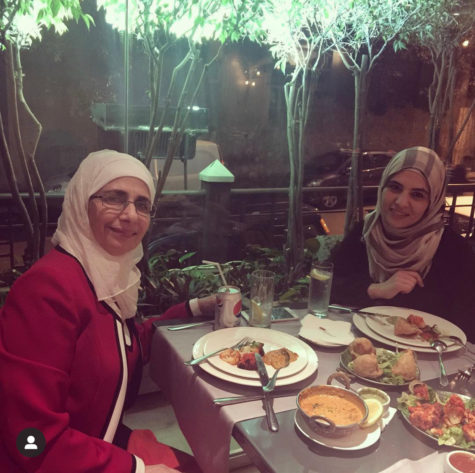
“I was working at the restaurant. I remember I had tears coming down my face, and I was just praying for everyone, not just my family, to be OK, and I started texting on WhatsApp everyone I know asking if they are okay,” she said.
Awkal was “heart-shaken” for the first half-hour following the blast. Her sister texted her that her mother was in the hospital. She was injured, but doing OK.
“I called my mom. Glass shattered in her face, chest and hands – she didn’t feel it, she just knew she needed to go to the hospital,” Awkal said. “On the street my sister had blood all over her hand, she had her hand against the window. You couldn’t drive, the roads were filled with debris and glass.”
As her sister navigated the chaotic streets, people called her, warning her not to visit hospitals that were at full capacity – or destroyed – from the blast. Eventually, they found one that had room for their mother.
“My mom had lost a lot of blood, so she needed a blood transfusion. They did it twice, and she needed surgery because her face was open. She had a big bruise on her chest. That was the first hour, maybe two hours of the chaos,” said Awkal.
Soon after receiving the news, many fundraisers started appearing online around the United States. Leena Abdelghany, a junior economics and psychology double major and treasurer of the Arab Cultural Association, worked with other students at the ACA on the organization’s fundraiser. They put out a flyer on Instagram announcing they were raising funds to send to Beirut. At the end of the fundraiser, through which the organization collected money directly on Venmo, they were able to raise around $2,000.
“A lot of schools and organizations fundraised, and a lot of money has been raised, so that’s a really positive thing coming out of all of the devastation,” she said. “It gave me hope that so many people wanted to see the city building and rising from the ashes. It’s important to have a community around and people that support you. It’s a situation where you feel like you can’t do anything, you’re stuck, because you’re not there, so it was really nice to fundraise and see people donate.”
Nasah began collecting supplies with her family to send to Beirut. After posting about what she was doing on her Instagram story, people reached out to her to drop off clothing, bedding and other supplies. Someone gave her the idea to do a “bingo box” fundraiser on Instagram, where someone posts a bingo-formatted list of donation options and tags people in each box as their followers start to donate. The donations she received from the bingo box were sent in a storage box to Beirut through NuDay Syria.
“I posted it and I was absolutely shocked. In under an hour-and-a-half I filled up and had gotten $300, and through those two days it was a little over $1,200 raised,” Nasah said.
Many of the people who donated to the fundraiser Nasah hadn’t talked to in years. Some were from college, others from a Model U.N. conference and high school.
“I remember being dumbfounded that people cared so much,” she said. “That just made me realize that although I’m here, the least I can do is spread knowledge and fundraise as much as I can because if every Lebanese person did this, think of how much money we would raise.”
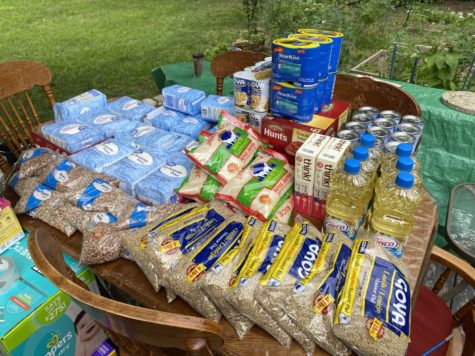
She described leaving work to buy supplies, medicine and pack everything into boxes to be shipped to Lebanon. Because of the economic crisis already happening in Lebanon, she explained, many people lost what they had in the blast and didn’t have the money to replace anything – while at the same time the country as a whole was struggling to import the supplies it needed.
In Springfield, Awkal began receiving requests from friends and customers to have a fundraiser at the restaurant, many of whom weren’t Lebanese but knew her family was and had reached out asking how they could help. She began collecting funds that she would later send throughout the month to people she trusted on the ground in Beirut.
“I have a lot of friends that called from Beirut and not, most of them weren’t even Lebanese, asked to make a fundraiser,” Awkal said. “I had a lot of people who weren’t Lebanese who came into the restaurant and wanted to give money to help and to transfer to all the people who got affected. Everyone got affected, you can’t say one person wasn’t affected. We sent it to people we trust, and it got distributed.”
Awkal said the fundraiser was able to help some of the people affected pay rent, help with their surgeries, medical bills and prescriptions. Between sending food and money, they sent more than $2,500.
Michel S. Moushabeck moved from Lebanon to the United States when he was 19 years old. He later founded Interlink Publishing, an independent publishing house in Northampton that publishes a wide range of work from around the world. After the explosion, he began a fundraiser called “Books for Beirut” through the publishing house’s website, which is ongoing.
“We’ve published nearly 30 leading Lebanese writers in translation, many of them live in Beirut and were directly affected by the blast. We started a campaign and offered to donate 30 percent of the sales of books by Lebanese authors to the Lebanese Food Bank,” said Moushabeck. “I was very touched by the messages of support and book orders we received. The campaign really served two purposes: to help raise funds, but also to amplify the voices of Lebanese writers.”
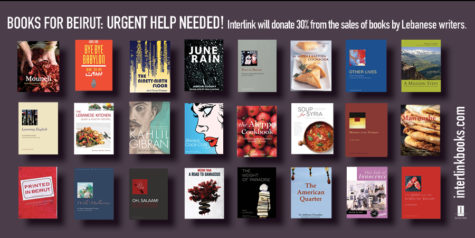
Moushabeck and others interviewed emphasized that within the devastation there were countless examples of people coming together to support one another – whether that be support internationally from the United States or support on the ground in Lebanon.
“I have been in daily touch with family and friends in Beirut. They have witnessed destruction and hunger like they have never seen before. But at the same time, they have also seen people coming together and helping each other like never before too,” Moushabeck said.
Bakeries donated bread to people throughout the neighborhood. Local chefs cooked meals and distribute to those in needy. Volunteers, many of them teenagers, worked together to clean glass and other debris from the city streets.
“There has been an outpouring of support. Many U.S.-based Arab-American nonprofits started campaigns to raise money for food and medical relief,” he said. “So many of my friends have donated their time to help raise funds for the Lebanese Red Cross, the Lebanese Food Bank and others doing relief work. I know several musician friends who gave Zoom concerts and donated all their proceeds and several artist friends donated paintings for an auction to raise funds for Lebanon.”
In Lebanon, Ghaddar drove into Beirut to volunteer with the Red Cross, distributing supplies and cleaning the streets.
“I didn’t do that too much because of coronavirus, but I did go three times and we got cans of food and stuff, survival packs and we cleaned the roads of Beirut and moved rocks and stuff,” Ghaddar said. “It was so amazing, there were so many volunteers. The first moment I went into Beirut after all of that happened it was so crazy. It was just a really amazing experience volunteering – it was nice to put yourself out there and feel like you’re doing something.”
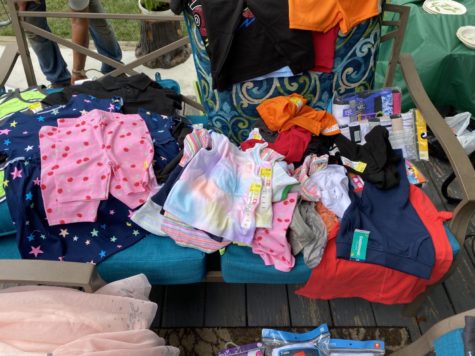
When asked what was most uplifting in the aftermath of the explosion, Awkal said what stood out was seeing “the love coming from everyone around here, to see the love that people have and the goodness that people have in their hearts, for every hardship around the world.”
“That was heartwarming. To see people until now still text or call me to ask about my family in Beirut,” Awkal said. “I have customers that know I’m from Lebanon and call to check on me and on my family back home. The kindness of people, people care. And sometimes you get so distracted by life and work, that we forget that people have very warm, good hearts.”
Ibrahim Akar, a junior business management major with an economics minor, shared stories he heard from Beirut of people coming together to volunteer.
“Most of my family’s spread out not in Beirut, but I still have a decent amount of family in Beirut, and they were directly affected by the explosion,” Akar said. “They had to move out of their homes because they were completely destroyed. What I think is really cool is to see people [of all ages] just all trying to help. They’re all there for each other.
Akar was heartened by the amount of camaraderie in the community.
“Everyone was there to help, people were hand in hand, Christians, Druze, atheist people,” he said. “Despite all the ideological issues there’s still this core value of helping people out.”
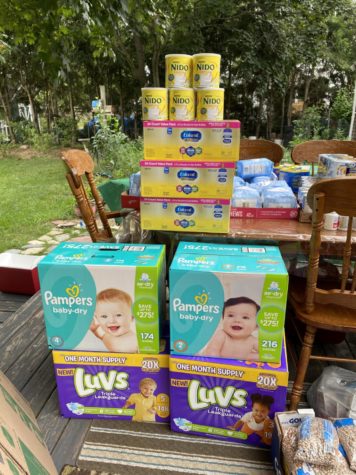
Students and alumni described the difficulty of focusing on work and schoolwork in the aftermath of the explosion. They also shared experiences of having UMass students and professors reach out to them, or professors acknowledge what happened in class.
“It was a very reassuring feeling that people recognize what’s going on. Obviously I’d have to explain in lectures especially at the beginning of the semester my situation and my being an international student, and people talked to me privately, they asked me how I’m doing with the situation – people are aware of it,” said Rami Bou-Ghanem, a senior economics major and international student taking classes from Lebanon.
Bou-Ghanem said he’s been impressed by the “prominence of international awareness” from those on campus, and an acceptance of international students in general.
Abdelghany said she found it more difficult to focus on schoolwork in the aftermath of the explosion.
“During the explosion it was summertime, so we weren’t in school, but it was hard to focus on anything,” Abdelghany said. “I remember the day of the explosion me and my family were just watching the news the whole day. We’re still watching the news. It was hard, I’m going to be honest, it was really hard to deal with.”
“I didn’t realize how time consuming this was going to be on top of working a full-time job, dealing with the emotional fall out of this, because I wasn’t okay,” Nasah said. “My family wasn’t okay. No one was OK, but we had to do this.
Her experience being of another nationality, but being far away in America during tragedy, was difficult to cope with, Nasah said. She reflected on the experience of going to a solidarity protest in Boston in the fall of 2019, when protests erupted in Lebanon against the government.
“No matter what, if the country’s burning, I wish I could be there,” Nasah said. “If the country’s celebrating, I wish I could be there. If the country’s revolting, I wish I could be there. Any moment like that happens I wish I could be there, but I can’t. It feels like your heart is 5,000 miles away.”
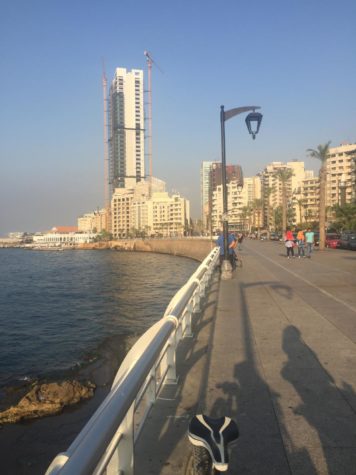
For Bou-Ghanem, there were WI-FI and electrical challenges that complicate his coursework, in addition to distraction from general concern about ongoing issues in Lebanon.
“Being directly affected by the overall circumstance of living here, hour to hour the power is out, you have to turn on the generator, you have to see if the WI-FI is working,” Bou-Ghanem said. If “the WI-FI isn’t working, you got to call the operator. The operator says the system is down because the government shut down their headquarters, so there’s those more direct obstacles that you face.”
For students mourning and having difficulty focusing, Nasah and others offered advice about what has been helpful for them in the aftermath of the explosion. Advice included taking a break from the news, taking time for oneself, reaching out to others and tapping into the support from one’s community.
“Acknowledge that it’s okay to take a step back, and not be constantly posting about everything going on. Because when you do that, you mentally get exhausted and that doesn’t help,” Nasah said. “It’s not helping your country, it’s not helping your people, it’s just sacrificing your own mental stability for nothing. So, I think it’s good to post when things need to be posted, but I think with everything going on in the world right now, that we need to take a step back off our phones and just breathe.”
“I think the number one thing to do was to talk about it, because letting things like that bottle up inside is just really negative, and it can weigh you down more than you think, so I think the number one thing is you just need to talk about, even if its someone who knows what’s going on I think that’s even better for you, because they might be able to provide some insight that you’re overlooking,” Akar added.
“Normalize how you’re thinking, don’t think you’re behind on your obligations because you’re in a less accessible position from people who live in the U.S. Don’t think you’re worth less than those who have the privilege of living in the U.S. Acknowledge that your struggles are real, and the fact that you’re able to persevere through them, on a personal level it provides more value to my life,” said Bou-Ghanem.
“I think it’s definitely really hard to deal with that alone, and if they need to reach out to anyone they should feel free to reach out to anyone in the Arab Cultural Association or to me,” said Abdelghany. “It’s hard to deal with these things alone, no matter what you’re dealing with, whether you’re Lebanese or if you’re having other difficulties at home, I think it’s just about building a community, and not being afraid to reach out when you feel like you need help or support.”
“Don’t give up, Lebanon is a beautiful country, we can’t give up, we can’t let the evil take over our country,” Awkal said. “All of us together, we can bring it back to what it was before 1976.”
When asked what they would want people not connected to Lebanon to know, many interviewees emphasized the resilience of the Lebanese people and expressed a deep love for their country. For people without personal connections to Lebanon, who are looking to learn more about what is happening in the country, Bou-Ghanem’s advice is to “talk to people.”
“That’s the only thing, see how people are being affected by their experiences, talk to them with an open mind,” Bou-Ghanem said. “It goes beyond what we’re talking about now in specific, it’s about seeing people as individuals… seeing them from the point of view of having their own experiences, and talking to them with an open mind. You’ll learn the most from talking to people.”
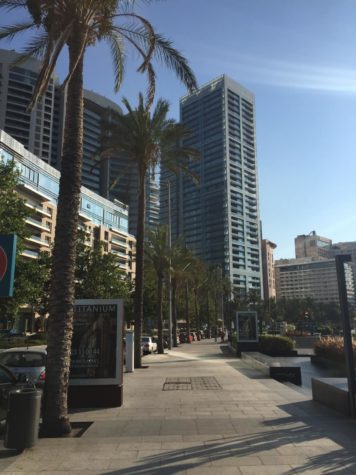
When it comes to understanding the larger context of the current situation in Lebanon, there are a wide range of factors contributing to an extremely difficult political and economic reality. After the explosion, it was revealed that many members of the government knew about the potential for an explosion due to the improperly stored explosives, and ensuing protests erupted across the country. These protests led to the resignation of the prime minister and his cabinet.
Akar, when asked what people should understand about the current situation, pointed to negligence from government officials.
“The problems within Lebanese politics are deep rooted and confusing, even to Lebanese people themselves,” Akar said. “I would suggest that if you’re going to try to talk to someone about what is going on that you try to take things with a grain of salt, because a lot of time they may have political biases or some form of trying to defame political groups when in reality it is much bigger than that.”
When asked what she wants people to know about the current situation in Beirut, Awkal pointed out daily challenges faced by people living there.
“People are not able to buy eggs and bread and milk for their family. Kids are not going to be able to go to school. People are going to be evacuated from their homes because they can’t pay rent. Some people will be dying in front of the hospital because they can’t afford to go inside,” she said.
She said if people want to help, she can recommend charities where they can send donations that will reach people on the ground. She also advised people to know that “ whatever they see in the news is not always right.”
“The people are not chaotic, they are not bad. The people are good, they have a lot of good in them, you see everyone helping everyone,” Awkal said. “We’re not bad people, we love our country, and I just wish it could go back to normal so we can show our kids and grandkids how life is in Lebanon and what a beautiful country and people we have.”
For other UMass students looking to learn more, Bou-Ghanem urged them to challenge their preconceived ideas they have about Lebanon in general.
“You have to realize two things. First is that we have a very rigorous and intense education system … we have people who are entrepreneurs who go build businesses abroad. The only reason we do that is because we don’t have the opportunity to use our power here,” Bou-Ghanem said. “That doesn’t necessarily mean that the foundation of education, of civility, isn’t there. It’s just that we don’t have the opportunity to express that here.
Because of his patriotism and admiration for the people in his country, Bou-Ghanem said he would choose to stay in Lebanon if the same opportunities offered in the United States were offered there.
“We have such a vibrant spirit as a people, we love life, we love partying, we love social events,” he said. “It’s just a beautiful place to be, but unfortunately we don’t have the chance to make a life for ourselves, we don’t have a chance to raise families here, to build anything that can last, because we have a system that oppresses us.”
Throughout descriptions of the challenges facing Lebanon, many people reiterated stories of “resilience” in Lebanon.
“Beirut, the city of my birth and upbringing, once the jewel of the Mediterranean, is today a city in mourning. But the Lebanese people are resilient and will survive this calamity as they have survived others before it,” Moushabeck said. “The sooner the people of Lebanon get rid of their failed government, dirty politicians and the influence and interference of foreign governments the faster they will be able to rebuild their lives, their economy and their beautiful country.”
Editor’s Note: The amount raised by the fundraiser was corrected from $25,000 to $2,500.
Claire Healy can be reached at [email protected]. Follow her on Twitter @clurhealy.
